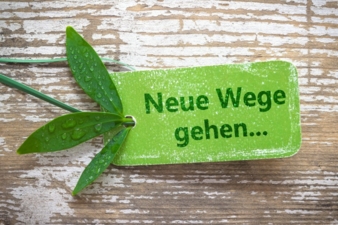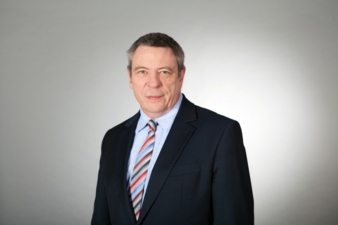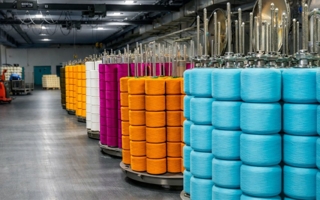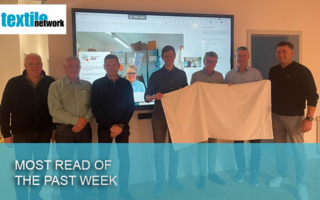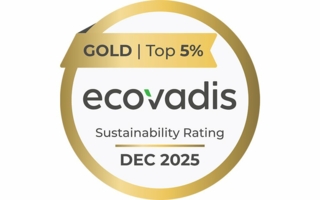27/08/2015 — auf Deutsch lesen
“Our industry wants more sustainability”
Dr. Uwe Mazura, Managing Director of the German Textile+Fashion Confederation, and Kai Falk, Managing Director of German Retailer Association HDE originally took a critical stance towards the Partnership for Sustainable Textiles. And yet, last June both associations finally joined. textile network wanted to know why...
Dr. Uwe Mazura: Some of the demands formulated in the action plan back in autumn 2014 were simply unfeasible. Since then, the Partnership has made significant changes in consensus with the German government and the civic society. It now foresees a new spirit of cooperation, the international implementation of the partnership and the inclusion of a clause for SMEs, allowing smaller firms to contribute to the processes within the Textiles Partnership.
Kai Falk: We only wanted to subscribe to an action plan within the Partnership that also allowed as many enterprises as possible to join. We succeeded in achieving this without compromising on the Partnership’s objectives. In our view, it was really important to ensure that the action plan was compatible with international initiatives and laws as there would be little point in Germany going it alone.
Kai Falk: We see our accession to the Partnership as a clear signal from the textiles industry that we are committed to improving production conditions in the supplier countries. We see sustainable consumption as one of the driving forces behind the HDE.
Dr. Uwe Mazura: Joining the Partnership signals our commitment to taking and documenting concrete measures that lead to greater sustainability in the supply chain. To the outside world, it is a sign that our industry is really serious about becoming more sustainable.
Dr. Uwe Mazura: Let me give you a few examples: We have formulated a new Code of Conduct for the German textiles and fashion industry that provides many of our companies with valuable guidance. We are running a range of company information events in collaboration with our industry associations. We have created a “Sustainability Forum” on our website which documents good practices and activities in the realm of CR.
Kai Falk: The Textiles Partnership is currently a major focus of our work. We will put all our energy into implementing the action plan once the Steering Committee is properly up and running.
Kai Falk: Based on a more concrete action plan, the Steering Committee has been charged with pushing forward with the implementation of the Textiles Partnership. As one of the twelve members of this body, the HDE will represent the interests of the economy over the next year and play a central role in the strategic steering and further development of the Textiles Partnership.
Dr. Uwe Mazura: Our role is to pursue the goals defined by the members of the Partnership and to take concrete action along the way. It is important to ensure we don’t overwhelm the companies because we certainly won’t be able to achieve any of our goals without them. Sustainability is a long-term process that is never-ending: It’s always possible to become more sustainable.
[Jana Kern]
The Partnership for Sustainable Textiles, largely shaped by Development Minister Dr. Gerd Müller, has made great progress in recent months. Triggering a rather tepid response when it was first established in October of last year, the tide has since turned: In April, the Ministry for Economic Cooperation and Development (BMZ) succeeded in defining a more concrete action plan in a dialogue with industry representatives and the Partnership’s interim Steering Committee. In June, several reputed new members joined including major players such as H&M, C&A, KiK, Adidas, Puma, Tchibo, Aldi, Lidl and the Rewe Group, along with SMEs such as Olymp, Schöffel and Seidensticker and the associations HDE, AVE and Textiles+Fashion.
Come the end of July, the list of signatures had grown to 143. At the same time, the Textiles Partnership generated widespread international interest at the G7 Summit in Elmau and is now considered a pioneering project for championing international commitment to fair standards in the global supply chain. The next step will involve the implementation of the Partnership’s standards. Since the election of the Steering Committee at the end of July, it has become clear who will be holding the reins.
Accordingly, the Steering Committee comprises the following members: the associations Textiles+Fashion Confederation and HDE, the companies Otto and Seidensticker, the NGOs Christliche Initiative Romero, Femnet and Inkota, the union Deutsche Gewerkschaftsbund (DGB) and the Global Organic Textile Standard (GOTS); government bodies in the Steering Committee include the Federal Ministry for Economic Cooperation and Development, the Federal Ministry of Labour and Social Affairs (BMAS) as well as the Federal Ministry for the Environment, Nature Conservation, Building and Nuclear Safety (BMUB).
In this series until now published:
Part 1 “Not if, but how“

